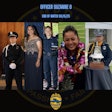Law enforcement is about 97 percent verbal interaction and only 3 percent physical interaction, according to a recent Rutgers University study. In keeping with such findings, a new communications philosophy, called Verbal Judo, has been making an impression on how law enforcement deals with the public.
Verbal Judo is a system of verbalization tactics, designed by Dr. George Thompson, an English-professor-turned-police-officer, after years of experience and observation of police interaction styles. This program has been so effective that it is now mandatory in many of our country's police departments and academy curriculums, including those in Los Angeles, New York, and Honolulu. Many agree with Officer Sean Collins, of the New York State University Police Community Relations Team, that we have "practiced some or all of these techniques for years without even realizing it."
Verbal Judo Objectives
Verbal Judo has a main theme of generating voluntary compliance, through verbal persuasion and maintaining what Thompson calls "professional face." This is a businesslike demeanor, even in the presence of insults. The three goals are:
1. Officer safety--Officers are taught to use words to prevent confrontations from becoming physically violent;
2. Enhanced Professionalism--Officers recognize the impact of their words on the public and use language appropriate to each encounter; and
3. Reduced vicarious liability--Officer who handle citizen encounters more skillfully are less likely to generate complaints and lawsuits and will also be more articulate in describing their reasoning and actions.
Verbal Judo boasts reduction rates of nearly 50 percent in citizen complaints against agencies that use the technique. Said Illinois State Police District 9 (Springfield, Ill.) commander Capt. Dennis E. "Denny" Sloman, "Everyone on my department is trained in VJ. It works. And when it doesn't work, it protects you civilly as it shows all the reasonable steps you were forced to take in the escalation of force to get the subject to comply."
Verbal Judo in Action
Verbal Judo focuses on three basic personality types: "Nice People" (cordial, cooperative, law abiding); "Difficult People" (challenging, questioning authority) and "Whimps" (passive-aggressive).
Verbal Judo teaches that when we encounter the difficult person who is uncooperative, instead of resisting, redirect that person's effort to your advantage. Respond with a "professional face" not a "personal face." Thompson says that the most dangerous weapon today's police officer carries is not the firearm but the "cocked tongue." He adds, "When we REACT to a situation, the situation controls us. When we RESPOND, we control the situation."
Verbal Judo addresses the common mistakes in verbal dialogue and discusses alternatives. Phrases to avoid in confrontations include shouting, "calm down!" The receiver perceives this as criticism and implies that they have no right to be upset. This exacerbates the situation.
Instead try, "What's the trouble?" stated calmly. How it is stated (nonverbal cues) is more important than what is said.
Another phrase mentioned in Thompson's book, Verbal Judo-The Gentle Art of Persuasion, is, "Come here!" Often when subjects hear this, they actually try to leave or may assault the officer. Thompson recommends replacing this command with, "Excuse me, but I need to chat with you a second." This softer approach is less threatening and gives the impression that the subject still remains some control.
Looking Good
The scrutiny under which we perform as officers is addressed by Thompson, who says, "We not only have to win on the street, but also in court and the media. It is not enough to be good. Got to look good and sound good or no good. Reality is that the inappropriate, abusive language that comes from an officer makes page one of the papers." We need to remember that we represent our agencies and the law and never our own egos.
Also, according to Thompson, if you respond to a burglary and really want to upset someone, just look unconcerned when you meet the victim. An officer appearing to empathize with the person in crisis diffuses many difficult situations.
Respect toward people as a tremendous impact on the way we are received and the cooperation we garnish. Many police administrators across the country express a desire for increased experience and training in the "soft skills" for their recruits.
Wisconsin has made this a top priority in its "Training for Tomorrow" initiative and as part of this has implemented a Professional Communications Advisory Committee, which is part of the Law Enforcement Training and Standards Board. North Found du Lac (Wis.) P.D. Det. Sgt. Paul Clarke, a member of this committee said, "It is my opinion that the Verbal Judo program is very good. The concept behind the program is sound, and the training techniques are powerful."[PAGEBREAK]
Deflecting Verbal Abuse
If someone directs a verbal attack at you, unless dangerous, let it go, and you will disempower that person. The insult only has life if it elicits some type of response. As long as the person is doing what you say, it doesn't matter what he/she says.
Officers must always remember never to step on someone's "personal face." If you have to arrest someone, let him or her blow off some steam, as long as he or she is physically cooperative. Remember, our goal is not to force compliance, but to gain voluntary compliance!
Art of Persuasion
Never ignore or dismiss a question. When a subject is asked for information, such as a driver's license, he or she may ask, "Why?" Rather than resist with, "Those are the rules," try explaining the situation in a non-sarcastic manner: "As part of my job duties I need to confirm the fact that you are of legal age to be present in this establishment." When we explain our purpose and reasoning, we often gain cooperation.
When attempting to gain compliance, first try to make an ethical appeal by asking. People comply if they believe in what we stand for.
If this is ineffective (often when duress is present) then move to a reasonable appeal after calming the person down. This is the "following policy and procedures" or "these are my constraints" approach. This will be effective on many with whom the "ethical appeal" failed.
The most difficult people need the "personal appeal." You will present what they have to gain or lose. An example would be: "This is a minor traffic violation but your refusal to cooperate will make this much more serious. We can take care of business and you will be on your way shortly, or this can be more complicated and you will spend the night with us. I'll have to do more paperwork. So we both lose. What do you say?" or something to along these lines.
The final option is the practical appeal. These are offbeat tactics like humor, re-focusing, and re-direction-as long as safety and integrity are not compromised.
If all else fails, make the final request of, "Is there anything I can do to get you to abide by my lawful order to (step out, place hands behind your back, etc.)? I'd like to think there is." If the response is that he or she is going to remain non-compliant then resort to the necessary physical options. If you have followed the steps, you can see how you will protect yourself tactically and legally.
Another tool discussed by Thompson is paraphrasing (re-stating the subject's message). In so doing, you can hook the other person into listening to you and take control, create empathy, and prevent misunderstandings.
Use a "sword of insertion" such as "listen," "wait a minute" or "let me make sure I understand this" as contrasted with "shut-up" or "get to the point." This politely interrupts the momentum and then you can paraphrase what you believe they're trying to say in a more logical and calmer manner. This has an enormous, calming effect and forces the person to listen. It also prevents "sonic intention" (people thinking they have said something that they only said in their minds).
Senior Inspector Bob Balletine of U.S. Customs in Buffalo, N.Y., related his own experience. "In one case, two males were stopped for a Customs examination during which a great deal of obstructive behavior was encountered. It reached the point where someone was going to go to jail.
"When they were separated (one went to accompany the vehicle search) I started talking to the other gentlemen, explaining why he was stopped and the procedures for the exam. I explained his options, that he would get done with the exam sooner if he cooperated, etc.
"In one response eh mentioned, 'first I lost all my money at the Casino and now I'm being hassled by Customs. Well of course this was the main issue, probably (losing money), and I chose to look into that. I told him that I knew how that was, losing money, and went on to describe my frustrations, then hooked back into the business at hand-something like, 'I know you are upset about the money, but we can't let that complicate what we are doing here.' It not only worked in calming in down, but when his friend returned (who was still fired up) he actually told his friend to relax and let us do our job so they could get out of there." Balletine added that a condensed version of communication tactics is taught at the Federal Law Enforcement Training Academy, using VJ concepts.
Summary
Though several law enforcement veterans have practiced some of these same principles for years, officers coming into Verbal Judo training are often skeptical at first. But once most of these officers attend the program, they end up adopting some or all of its principles.
Since public awareness and expectation levels demand the highest levels of professional conduct and the video camcorder is now in common use, we owe it to ourselves to take dialogue as seriously as any other force instrument.
Special thanks to the Verbal Judo Institute and George Thompson, Ph.D., a former and current reserve deputy with Sandoval County (N.M.) Sheriff's Dept. You can visit the Verbal Judo Web page at: www.verbaljudo.com.
Brian Scott is a police officer with the Cudahy (Wis.) P.D. Scott, a certified firearms and O.C. instructor, is an occasional contributor to POLICE.









